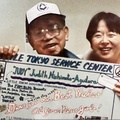Chapter 1 >>
Solicitor Phyllis Hamakawa looked out her Toronto city council office and felt her stomach churn. She could have blamed the dim sum she ate at a lunch reception in Old Chinatown, one of the three Chinatowns in Toronto proper. But she knew her unease had nothing to do with shrimp har gau and everything to do with Terrence Spicer’s resignation from his ward position this morning. Although they discussed council business in public, she hadn’t spoken to Terrence privately in two months, ever since she broke it off.
It hadn’t been fear of scandal or being discovered by his wife. The reason why she ended their relationship was because of the Toronto high school students they honored at City Hall. Before then, his daughter, Mackenzi Spicer, had just been a concept, but on that day, she became real—a thin, pretty girl with shoulder-length straight hair and eyes that seemed happy even when she wasn’t smiling. Phyllis could remember her own daughter Cassandra being that age. She couldn’t bear to be the cause of any sadness to those eyes.
Now Terrence had resigned, the reason a mystery to his staff and constituents. But Phyllis could only guess. A Toronto newspaper reporter had been calling her all morning, asking for an interview about Terrence. But why her?
Her phone flashed.
“Councillor—” her secretary’s usually steely voice seemed a little too high-pitched. “I just heard on the news that there was a mysterious death at your grandmother’s retirement home.”
Phyllis cancelled her afternoon appointments and was in her car within ten minutes of receiving the news. Cassandra was out on her own, working in New York City. In her weakened state, Baa-chan had become her new daughter. After all, Phyllis had promised her late mother that she would always take care of Baa-chan no matter what.
The news from the car radio provided no specifics—only that a number of the residents had fallen ill. And the retirement home manager wasn’t taking any calls. Phyllis felt her heart race. Baa-chan, please be alive, she murmured. She couldn’t believe that her mother was already gone and if anything happened to Baa-chan—Phyllis couldn’t take the loss right now.
The retirement home parking lot was filled with news vans with their satellite dishes and multiple ambulances. Phyllis recognized the faces of a number of children of the residents crowding the front door. “Councillor Hamakawa, Councillor—”
It was the pushy reporter from the Toronto newspaper who had been calling all morning.
“My grandmother lives here,” Phyllis said curtly and members of the crowd seemed to respect her concern. A few of them made room for Phyllis to move into the building.
The manager was in the lobby being interviewed by a news crew. Phyllis heard just random bits—one fatality, ten fallen ill, mysterious symptoms.
Baa-chan had gone through so much. She had immigrated to Vancouver from Wakayama. Married Jii-chan. Had three children before World War II. Then Jii-chan, like the other Japanese Canadian males, was sent away to a labor and the POW camp in Canada’s interior. A few months later, women and children were then forcibly removed from the Pacific Coast and placed into camps. Baa-chan and the children didn’t see Jii-chan until after the war. It was because of this experience that Phyllis decided to get into politics in the first place. And make sure that Baa-chan would never ever be alone.
As soon as the interview was over, Phyllis made her way to the manager.
“Ms. Hamakawa,” the manager said. “Your grandmother is under observation.”
“What does that mean?” As a politician, Phyllis did her share of double talk and knew when she heard it.
“She’s not exhibiting any symptoms, but she’s weak.”
“Where is she?”
The assistant manager was called in and Phyllis followed her to the elevator. The assistant manager was a forthright woman; she would disclose the truth—or at least as much as she could while also keeping her job.
“What is it? A virus?” Phyllis asked as they waited by the elevator.
The assistant manager lowered her voice. “They think that it may be some kind of food poisoning.”
“What did they eat for breakfast?”
“Oatmeal. Coffee. And—” The assistant manager swallowed.
“And what?” Phyllis demanded.
“Strawberries.”
***
Carlos Yamashita loved everything Japanese. Anime. Manga. Power Rangers. Godzilla. Nintendo. Samurai movies. He could picture his ancestors strutting down the dirt roads of ancient Japan, their hair tied back in top knots and a sword hanging from their obi belts. So for him going to Japanese school in Paraguay was not a chore, but a joy.
He carried his Japanese textbook, Niji Nihongo, in his backpack everywhere he went, even when helping on the family farm. His father was from Paraguay but he could speak Japanese fluently—at least that’s the way it sounded to Carlos. Papa grew up in Chavez Colony and then moved to Yguazu on the east end of Paraguay. Everywhere they looked—the green knee-high bushy rows of soybeans. That was until Bisabuelo arrived.
Carlos wasn’t sure if they were really related to Bisabuelo, or even how he came to Paraguay. Bisabuelo wasn’t from Paraguay or Japan. But Estados Unidos. Bisabuelo didn’t talk to Carlos much, which was fine with him. Most old people scared Carlos, and Bisabuelo was very, very old. Even older than a century. But even more than that, it was his spirit. His wrinkled face seemed to be always pressed together in a scowl, even when he slept. That’s why he was able to live so long, Carlos figured. There was something dark deep inside of him that he wasn’t about to let go. That darkness was like a life preserver, keeping the old man floating for apparently decades longer than he was meant to be around.
Bisabuelo was the one who convinced Carlos’ father to try a grand experiment. Strawberries. Ichigo. Fresas. Fresas had been Carlos’ mother’s favorite fruit—in fact, her lips even looked a little like strawberries, Carlos’ father said. Carlos couldn’t remember—she had died when he was three—but he would study her old faded photos to see if it was true.
In honor of his wife’s strawberry lips, Carlos’ father agreed with Bisabuelo’s proposition. First it was one acre. Then five. And now ten.
Carlos’ father even found a special distributor to handle his strawberry crop. Ever since the strawberries started producing, Bisabuelo seemed even more energetic—to the point that he would regularly be out in the fields in his wheelchair, studying each stage of the fruit with a magnifying glass.
Last week Carlos’ father announced,“We are going on a trip. You, me, and Bisabuelo.”
“Where?” Carlos asked.
“It’s a surprise, hijo.”
Nippon. It had to be. In town was a tall red torii gate. In a few days, I’ll be seeing the real thing, Carlos thought to himself.
They took a small plane to Asuncion, the major city in Paraguay. In the airport in Asuncion, Bisabuelo handed up a McDonald’s bag. McDonald’s? Carlos had only heard about McDonald’s.
“Don’t open,” Bisabuelo told him, tightly gripping his wrist. “And don’t lose it. Just tell the examiners that this is your lunch.”
Because of Bisabuelo’s wheelchair, he had to go down a different row from the others who waited to walk through the metal detector. When Carlos couldn’t see the old man, he snuck a look in the bag. There was a stale bun in the paper wrapper, but no hamburger or fish fillet. Instead, there were some baby strawberry plants tightly wound in a paper napkin.
“Carlos,” his father called out from the other side of the metal detector. “It’s your turn now.”
***
“Not another book, Sayuri. I thought that we agreed.” Greg Shishido was looking at the credit card bill, highlighting each charge that he thought was excessive. His fingernails were filthy, but Sayuri wasn’t going to say anything. These days Greg barely seemed to have time to take a shower after work. He wasn’t staying in the office negotiating sales and orders. The last few days he was in the fields.
“That is not a book, it was a CD. It was that Garden State CD I bought for your birthday.”
“Oh,” Greg said, his voice softening.
“You know, I want to work.”
“I know.”
Sayuri was waiting on her green card. Being married to an American didn’t make her an American. “I can help you and your dad. I can file letters and answer the phones.”
“The family rule,” Greg replied.
Sayuri sighed. The silly family rule. Only Shishidos related by blood were allowed to work on the ranch. But Greg’s two brothers had left the family farm years ago. And since the farm was in trouble now, it seemed like the time for new rules.
Greg seemed to agree. “Look, I’ll talk to my dad.”
The talk seemed to work. In two days, Sayuri was at the computer on the spare desk, e-mailing order fulfillment forms. Greg’s mother, Alex, must have heard of Sayuri’s offer, because she was sitting at her husband Bob’s desk, manning the phones. The two men were out with the foreman Zip checking the fields. Someone had recently vandalized several rows, rearranging them into a strange circle with thirteen strawberry plants arranged around it. Bob, in fact, had taken a digital photo of the damage and a blown-up image was now tacked on the wall.
“You should take a break, Sayuri,” Alex called out after scrawling down a message for Bob. She was a sturdy woman with hair the color of shaved bonito. She was an affectionate woman, who regularly hugged Sayuri every time they met. Sayuri was still getting used to American affection, but quite honestly, it made her skin crawl. She didn’t have the heart to say anything to her hakujin mother-in-law. It wasn’t that she disliked Alex. In fact, she was very fond of her. The best way Sayuri could return her mother-in-law’s affection was to share her passion—history and books.
“I thought that you might want to see these books that I got from Greg’s cousin’s family.” Sayuri brought over two of the Japanese-language textbooks and put on some white gloves.
“What’s that for?” Alex looked amused.
“So the oil from my fingers doesn’t damage the books.” Sayuri opened the red one, “Amerika Nihongo Dokuhonzen,” All America Japanese-Language Reader. She pointed a gloved finger to some writing on the inside cover. Haru Shishido, it read. 1922. “That’s Greg’s great-aunt’s name.”
“Wow, that’s amazing,” said Alex. “You know, I don’t think Bob knows that much about his family history. I mean, he knows about strawberries, but not much about the family members who grew them.”
Sayuri had yet to really study the textbook and turned to the title page. The image there seemed familiar. She had seen that pattern before.
“What’s wrong, Sayuri?”
Sayuri left the book open and walked over to the far wall. “That—” she said, referring to the vandalism done to the field, “is the same design as in the book.”
Alex stood up and took a closer look at the page. A circle with thirteen stars around it.
“It’s just a coincidence.”
“It’s no coincidence,” Sayuri said. “There’s something about this book that’s connected.” She leafed through the book and then noticed some handwriting in the margins in pencil. Some Japanese writing and then a list of numbers. She didn’t know much about soil and green plants, but she understood paper. And these papers were trying to tell her something—but what?
* “The Nihongo Papers” is a work of fiction. The characters, incidents, and dialogue are drawn from the author’s imagination and are not to be construed as real. Any resemblance to actual events or persons, living or dead, is entirely coincidental.
© 2007 Naomi Hirahara





